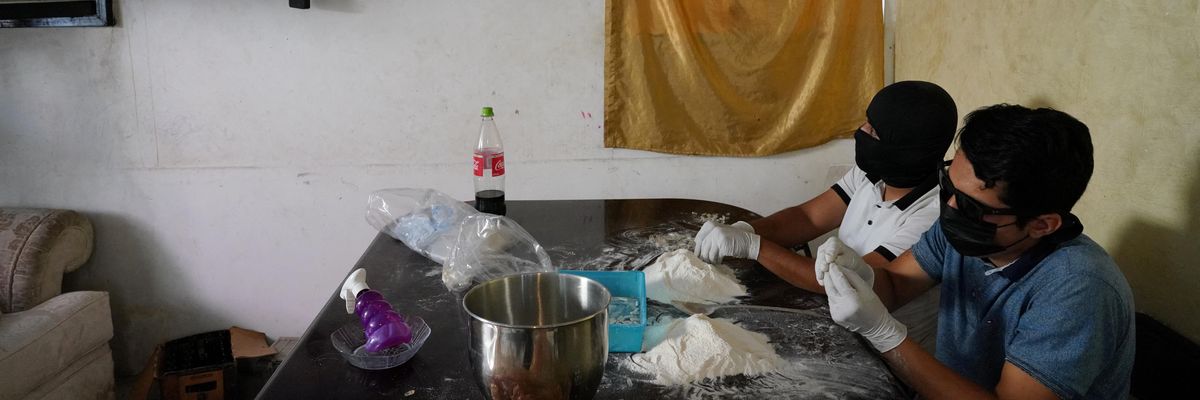The United States is facing the worst drug crisis in its history. Fentanyl is killing Americans at record rates. When President Richard Nixon launched the war on drugs in 1971, annual overdose deaths were 6,771. Last year, 107,375 Americans died from drug overdoses, and fentanyl was responsible for nearly 70 percent of those deaths.
Unfortunately, efforts to cut off the flow of fentanyl are at an impasse due to frayed relationships with other countries involved in the supply chain. In response, a growing number of American politicians are calling for military action. This dangerous rhetoric will only exacerbate the crisis and alienate key partners. Declaring a war on drugs has never solved the problem. It’s time to take a different approach.
Fentanyl production starts in China, where seemingly legitimate Chinese pharmaceutical companies sell precursor chemicals to front companies for the Sinaloa and Jalisco drug cartels in Mexico. These two cartels then synthesize the chemicals into fentanyl and move it to the United States by land, sea, and air to safe houses for nationwide distribution.
China had initially showed promise in collaborating with the United States to stop the flow of fentanyl, cracking down on direct sales, and even working with U.S. law enforcement on drug busts. But as tensions rose between the two countries, collaboration fell and was formally severed after then-House Speaker Nancy Pelosi visited Taiwan in August 2022.
The U.S. relationship with Mexico is less strained by comparison but has deteriorated since the United States arrested one of Mexico’s former defense ministers in 2020 for allegedly working with a cartel. President Andrés Manuel López Obrador (widely known as AMLO) responded with intense pressure and threatened to kick Drug Enforcement Administration agents out of Mexico until the general was returned. The United States ultimately complied and dropped all charges, but law enforcement and intelligence cooperation between the two countries fell apart. Although high-level bilateral meetings last April may pave the way for improved collaboration, AMLO has avoided acknowledging Mexico’s role in the epidemic, instead blaming American families and “a lack of hugs” for the fentanyl crisis.
Some politicians have responded to the lack of cooperation by source countries with calls for military intervention. Sen. J.D. Vance (R-Ohio) recently called on President Joe Biden to use the U.S. military to go after cartels inside Mexico, and Sen. Tom Cotton (R-Ark.) has made similar comments. Earlier this year, Reps. Dan Crenshaw (R-Texas) and Michael Waltz (R-Fla.) also introduced a bill seeking authorization for use of military force that would “put us at war with the cartels.” Crenshaw was later tapped to lead a task force on the Republican response to the criminal organizations. For many of these U.S. officials, China’s contribution to this problem is just another reason for an adversarial approach.
Former President Donald Trump has mentioned using special forces and cyber warfare against Mexican cartels if he were reelected and asked his advisers for “battle plans” to attack Mexico. GOP presidential hopeful and current Florida Gov. Ron DeSantis has made similar campaign promises. AMLO has called these statements both irresponsible and offensive to the people of Mexico, stating that his country “does not take orders from anyone.”
Even if this kind of intervention seems farfetched, such comments by sitting U.S. officials and presidential candidates are alarming. Deploying military force against cartels in a foreign country explicitly against the will of that government would constitute an act of war, and these aggressive statements directly undermine bilateral efforts at renewed collaboration.
The United States has already designated the Sinaloa and Jalisco cartels as Transnational Criminal Organizations, which authorizes the use of economic sanctions and other financial tools. Lawmakers in both chambers want to take this a step further by designating each as Foreign Terrorist Organizations, which would enable strike options for the U.S. military.
But the juice wouldn’t be worth the squeeze. In exchange for fracturing our relationship with our largest trading partner, at best such actions would take out a few individuals — not the fentanyl trade. If anything, unilateral military action would increasingly destabilize much of Mexico’s ungoverned territory, sending large swaths of asylum seekers to the U.S. border and further overwhelming the U.S. immigration system.
It's easy for a country with a powerful, well-resourced military to default to using force, and laying blame on other countries helps pave the way. But rather than fix America’s drug crisis, these actions would significantly limit U.S. foreign policy options. Instead, the United States should continue efforts to improve bilateral cooperation on this issue and focus on domestic solutions that will not only help Americans but also our relationship with Mexico.
AMLO has said that Mexico’s domestic security problems take priority over helping the United States with the drug epidemic, so the White House must make clear that the two go hand-in-hand. Every year, 200,000 guns are smuggled from the U.S. to Mexico, arming the cartels and contributing to horrific gun violence. An estimated 70-90 percent of firearms recovered in Mexico between 2014 to 2018 came from the United States. Taking steps to reduce that impact could go a long way toward facilitating cooperation, and it could weaken the Sinaloa and Jalisco cartels.
The White House is also limited by its reliance on Mexico to tackle the immigration issue. Comprehensive U.S. immigration reform would provide Washington with more leverage to induce cooperation with Mexico.
There will be no quick fix to the current drug crisis — only multipronged solutions that address both the supply and demand of fentanyl. Prioritizing collaborative, diplomacy-first foreign policy over a militarized response is a critical place to start.















